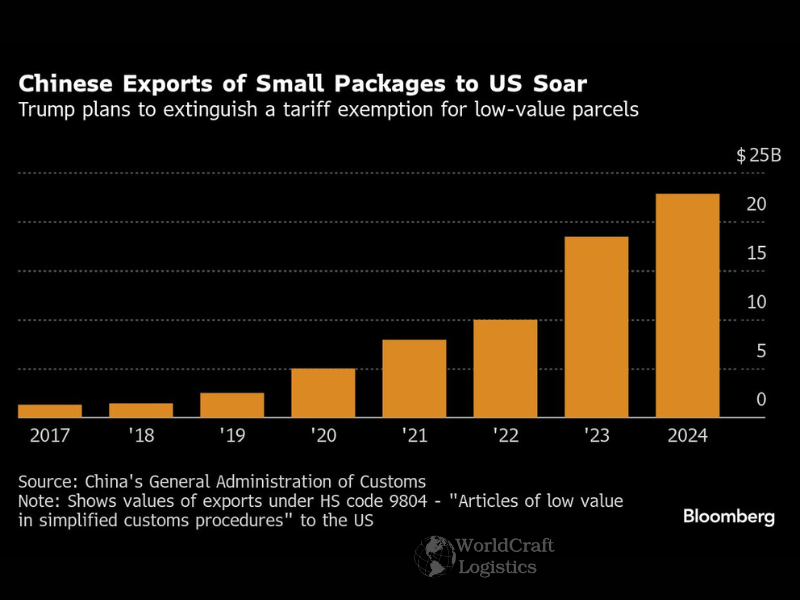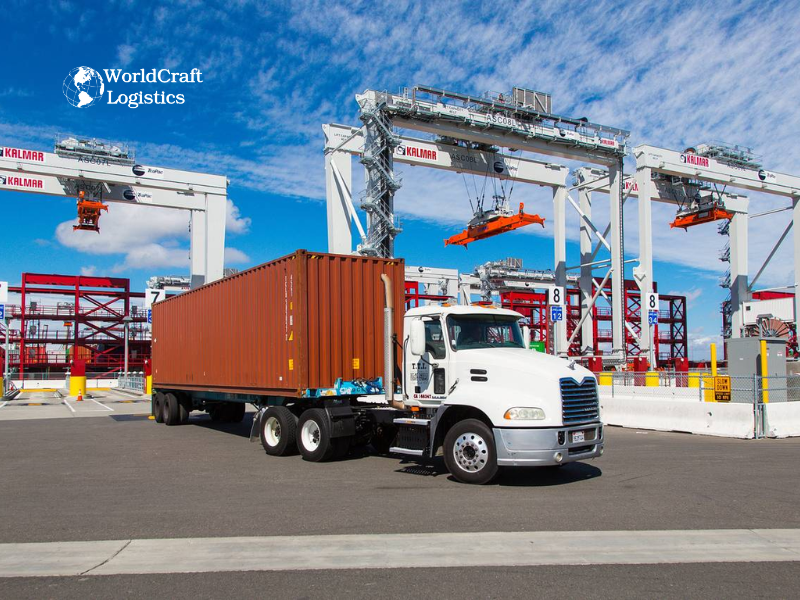
Starting June 1st, 2023 Our warehouse fee will be $0.65/cubic foot per month
In effort to lower the warehouse storage fee during inflation, we have went narrow aisle racking.This construction took us four months but the project is finally completed. With narrow aisle racking, we are able to drop storage by 24%.We as partners will go through this inflation together.
02/09/2025
Logistics firms are grappling with the immediate fallout of former President Donald Trump’s decision to revoke the "de minimis" rule for China, a move that effectively closes a loophole allowing small packages under $800 to enter the U.S. duty-free. The policy change, which took effect at midnight on February 4 (Washington time), is set to significantly impact cross-border e-commerce, affecting major online retailers like Shein and Temu.

The initial response from the logistics sector has been marked by confusion, with some firms in China quickly adjusting their pricing structures to mitigate the effects of higher tariffs. Beyond immediate disruptions, the policy shift carries broader economic implications, potentially straining U.S. consumers already facing cost-of-living pressures.
While China’s official data reports approximately $23 billion in small parcel exports to the U.S. in 2023, Nomura Holdings Inc. estimates the actual figure could be as high as $46 billion. The revocation of the de minimis rule may reduce China’s export growth by 1.3% and dampen its GDP expansion by 0.2%, further adding to the challenges facing the world's second-largest economy.
Trump's policy change has underscored the complexities of the international supply chain, particularly in the small-parcel shipping sector. National postal carriers, including the U.S. Postal Service (USPS), handle around 50% of international direct mail services, making their response crucial in shaping the industry’s adaptation to the new rules. The USPS’s initial uncertainty over handling packages from China and Hong Kong has further unsettled logistics providers.
The logistics sector predominantly relies on three main shipping methods:
National postal carriers: The most cost-effective method, typically taking two to three weeks for delivery.
Air cargo services arranged by logistics agents: This mid-tier option, representing about 40% of the market, offers delivery within one week but at a higher cost.
Express courier services: Companies such as FedEx, UPS, DHL, and China’s SF Holding Co. handle about 10% of the market, offering the fastest yet most expensive shipping solutions.

The policy shift has prompted a variety of responses from key logistics providers and retailers:
Hongkong Post: The postal service has temporarily suspended parcel shipments to the U.S. while engaging in discussions with USPS to clarify tariff-related matters.
USPS: The U.S. Postal Service continues to accept all international inbound mail and packages from China and Hong Kong. It is coordinating with U.S. Customs and Border Protection to ensure smooth tariff collection and minimize disruptions.
FedEx: The company has assured customers that shipments between the U.S. and China are ongoing. However, it has not disclosed whether flight schedules or delivery times have been altered.
UPS: The logistics giant has reaffirmed its commitment to maintaining services to and from China and Hong Kong.
DHL: DHL Asia Pacific has indicated that additional fees and longer transit times may be expected, though it has not suspended package handling from Hong Kong to the U.S.
SF Express: One of China’s largest logistics providers, SF Express has implemented a clearing fee of 20 yuan ($2.70) per package and a pre-collected tariff deposit of 30% based on package weight.
Shein and Temu: Vendors selling through these platforms have been informed of a new 30% levy on shipments, which must be paid upfront as a deposit. Logistics agents will later adjust the amount based on the final tax assessment from U.S. customs.

The long-term implications of Trump’s trade crackdown remain uncertain. While logistics companies and retailers are adapting to the immediate financial and operational challenges, the broader impact on U.S.-China trade relations and consumer prices could be significant. If additional trade policies are introduced, further disruptions may reshape international e-commerce and cross-border shipping in the months to come.
Read more:
SEO
Digital Marketing/SEO Specialist
Simon Mang is an SEO and Digital Marketing expert at Wordcraft Logistics. With many years of experience in the field of digital marketing, he has shaped and built strategies to effectively promote Wordcraft Logistics' online presence. With a deep understanding of the logistics industry, I have shared more than 500 specialized articles on many different topics.

Hot News
08/05/2024

Hot News
02/23/2023

Hot News
02/23/2023

Hot News
02/06/2023
Hot News
02/07/2023